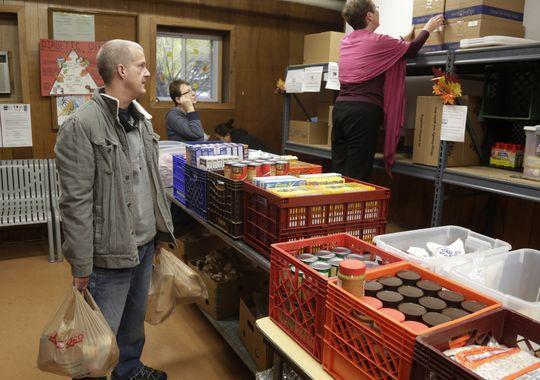"I was hungry ..."
By Steve Manskar

47 million Americans who depend on Food Stamps (aka: SNAP) to make ends meet each month will see a decrease in their monthly food budget beginning on November 1. Many of those families will go to their local food bank to supplement the decrease in their monthly food stamp allotment. Many food banks, already struggling to meet the pre-November 1 needs, will find it difficult to help the expected increase in families experiencing cuts in their Food Stamp benefits.
Covenant Discipleship groups can help local food banks serve the expected increase in demand for food assistance. Making weekly or monthly donations of food and cash to a local food bank is an act of compassion. Group members could also sign up to serve as food bank volunteers.
Many Covenant Discipleship groups struggle with finding opportunities for practicing acts of justice. An act of justice that is most needed today and during the coming year is to write letters and make telephone calls to your Congressman/woman and Senators. Encourage them to oppose further cuts to SNAP (Food Stamp) funding. Learn about the growing problems of hunger and food insecurity in America. Join with members of other congregations and community organizations to advocate on behalf of the families who depend upon Food Stamps to meet their nutrition needs. To learn more about hunger and food insecurity in America go here, here, and here.
Ministry with low-income people is one of the hallmarks of the Wesleyan tradition. John and Charles Wesley insisted that Methodist societies provide for the material and spiritual needs of people who suffered hunger, illness, homelessness, and social neglect. Therefore, Methodist societies provided food for the hungry, clothing and blankets for the ill-clad, medicine for the sick, and care for the neglected. They engaged in regular, disciplined acts of mercy because John Wesley believed Jesus was serious when he said, “Truly I tell you, just as you did it to one of the least of these who are members of my family, you did it to me” (Matthew 25:40). Jesus is very clear in the parable found in Matthew 25:31-46 that caring for people who are hungry, thirsty, lonely, naked, sick, and prisoners is required of people who profess faith in God and seek to live as citizens of God’s kingdom. He is equally clear that when we neglect the needs of the poor we give up our place in God’s kingdom. Neglecting the poor is a rejection of the person, teachings, and promises of Jesus Christ. This is why Wesley insisted the being a Methodist meant being one with the poor.
John Wesley preferred the company of poor people over the prosperous because they were more receptive to the gospel of Jesus Christ. When he ate at their tables and slept in their homes he found humility and generous hospitality with poor families. Wesley seldom found such characteristics in the homes of the prosperous and powerful. Therefore, the majority of the early Methodists were people who lived in poverty. They were eager to receive the good news of God in Jesus Christ and to follow him by obeying his teachings, summarized in Matthew 22:36-40.
Ministry with the poor is a mark of a vital congregation. Supporting local food banks and nutrition programs is one of the ways congregations can be good news to the poor of their neighborhood.
Work for the weak, and sick, and poor
Raiment and food for them procure,
And mindful of God's word,
Enjoy the blessedness to give,
Lay out your gettings to relieve
The members of your Lord.
"Your labor which proceeds from love,
Jesus shall graciously approve,
With full felicity,
With brightest crowns your loan repay,
And tell you in that joyful day,
"Ye did it unto Me."
Charles Wesley
